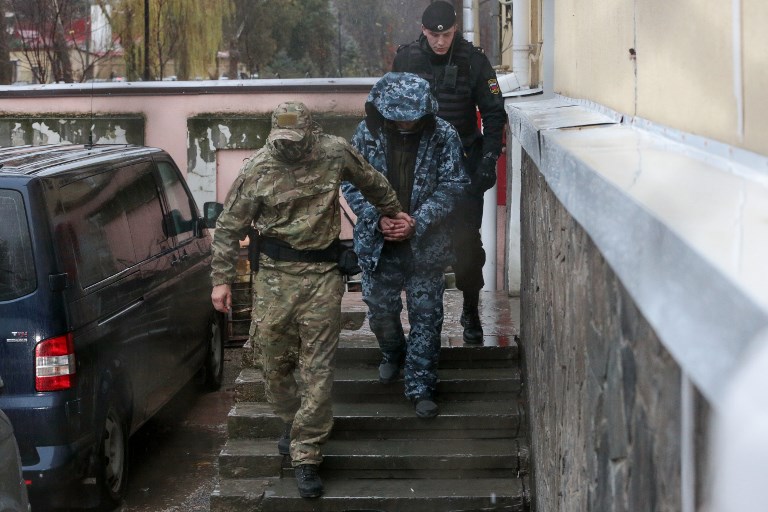WASHINGTON, D.C. — Foreign policy experts who gathered at the Atlantic Council think tank in Washington, D.C., on Dec. 5 criticized the West for a weak response to Moscow’s attack on Nov. 25, when Russian ships opened fire on three Ukrainian vessels in the Kerch Strait and then seized boats and 24 sailors.
Several Ukrainian soldiers were wounded by shrapnel from shellfire as the much larger Russian vessels fired on their smaller boats. Some are still hospitalized while all remain in captivity. The strait is the entrance to the Azov Sea, which is supposed to be a shared waterway between Russia and Ukraine under a 2003 treaty. Moscow has blamed Kyiv for the incident, an accusation that Ukraine and most of the Western world rejects.
The violent episode was the first time that regular Russian forces had openly attacked Ukraine, although Russian forces have been in Ukraine from the start of the Kremlin’s war in 2014.
On Nov. 28, Kyiv imposed martial law in 10 oblasts for 30 days as a response to the attack, as fears mounted the incident was prelude to a wider Russian offensive to grab more territory in Ukraine.
All the speakers lamented the lack of biting penalties on Russia.
But the director of the Atlantic Council’s Eurasia Center, which has been one of the most active in studying and publicizing Moscow’s war on Ukraine, former U.S. ambassador to Kyiv John Herbst, believes that the American government will become tougher with Moscow in the new year.
Last month saw “midterm” elections in the U.S which shifted the balance of power in a way he believes will favor Kyiv and force American President Donald Trump’s government to act more robustly toward Moscow. He said: “When you see the new Congress you will see a stronger reaction and that in turn may prompt the Europeans to be tougher on Russia.
Celeste Wallander, president of the US-Russia Foundation think tank, said that although Moscow had long ago demonstrated it was ready to use violence to further its foreign policy aims, the Russian aggression at sea on Nov. 25 had taken Moscow into a “new dangerous and unpredictable” scenario, as it marked the first time the Kremlin had used maritime military force.
She said that, throughout the conflict the Kremlin has “tactically won” because responses and sanctions had always been slow in coming.
She said the Kremlin and Vladimir Putin’s kleptocratic elite fear that if democracy and prosperity take root in Ukraine it will become difficult for them to maintain their regime. But she said any further sanctions should be carefully crafted to “distinguish between Russian national interests and Putin’s Kremlin feeding its corrupt needs.”
A former U.S. ambassador, Daniel Fried, echoed some of Wallander’s views. He was a prominent decision-maker in former U.S. President Ronald Reagan and George W.H. Bush’s policies toward the Soviet Union. He said that Putin will eventually lose, but sanctions and responses must be calculated to inflict pain on the Russian dictator and his cronies rather than ordinary Russians.
He said: “Putin is playing a bad hand well … but if we organize well we will have the higher grounds. Fried said the eventual goal should be not to crush Russia but “to have a better relationship with a better Russia.”
American General Philip Breedlove, who was NATO commander in Europe from 2013 to 2016 and who is now retired, said the U.S. and the rest of the West had repeatedly responded tamely to Russian aggression. He said: “Twice, in Crimea and Donbas, Moscow used military means to change European borders………we missed the opportunity to take immediate action, action which would have had an effect.”
He criticized Washington’s response to Moscow’s 2014 invasion of Ukraine asking “what did we do? We sent brave, brave MRE’ [meals ready to eat army rations] to Ukraine and much later some communications and other [non-lethal] equipment.”
He said America should have provided Ukraine with more resources to defend herself but responded weakly in 2014 and later because it was anxious about provoking Moscow’s anger. The sanctions always came late he said and this “their timing watered down the [political] effect for Ukraine.”
Apart from timid reactions to the Kremlin invasion of Crimea and the Donbas, Breedlove listed the Russian shoot-down over Donbas of the MH-17 Malaysian airliner in July 2014, killing all 298 people on board, and Moscow’s refusal to adhere to its Minsk accord commitments as other examples of Western failure. He fears that some Western politicians had come to accept Russia’s use of military force to achieve its aims as “the new norm.”
Breedlove said: “We have to decide publicly that we have to confront these actions. If we don’t, why should we expect them to change?”
Breedlove said that by its actions in the Black and Azov seas, which include Russian harassment and interdiction of hundreds of international civilian merchant freighters, had Russia had effectively abrogated the 2003 treaty with Ukraine.
That treaty allowed either Ukraine or Russia to forbid the entry of third country vessels. Breedlove, who wants NATO to increase its naval presence in the Black Sea, said that Moscow’s abrogation of the treaty put in question her right to protest NATO ships entering the Azov Sea.
Asked what would he thought would be NATO and the West’s reaction if Ukraine fired back on Russian vessels attacking its ships, he said: “I believe that every country has the right to defend itself”.



